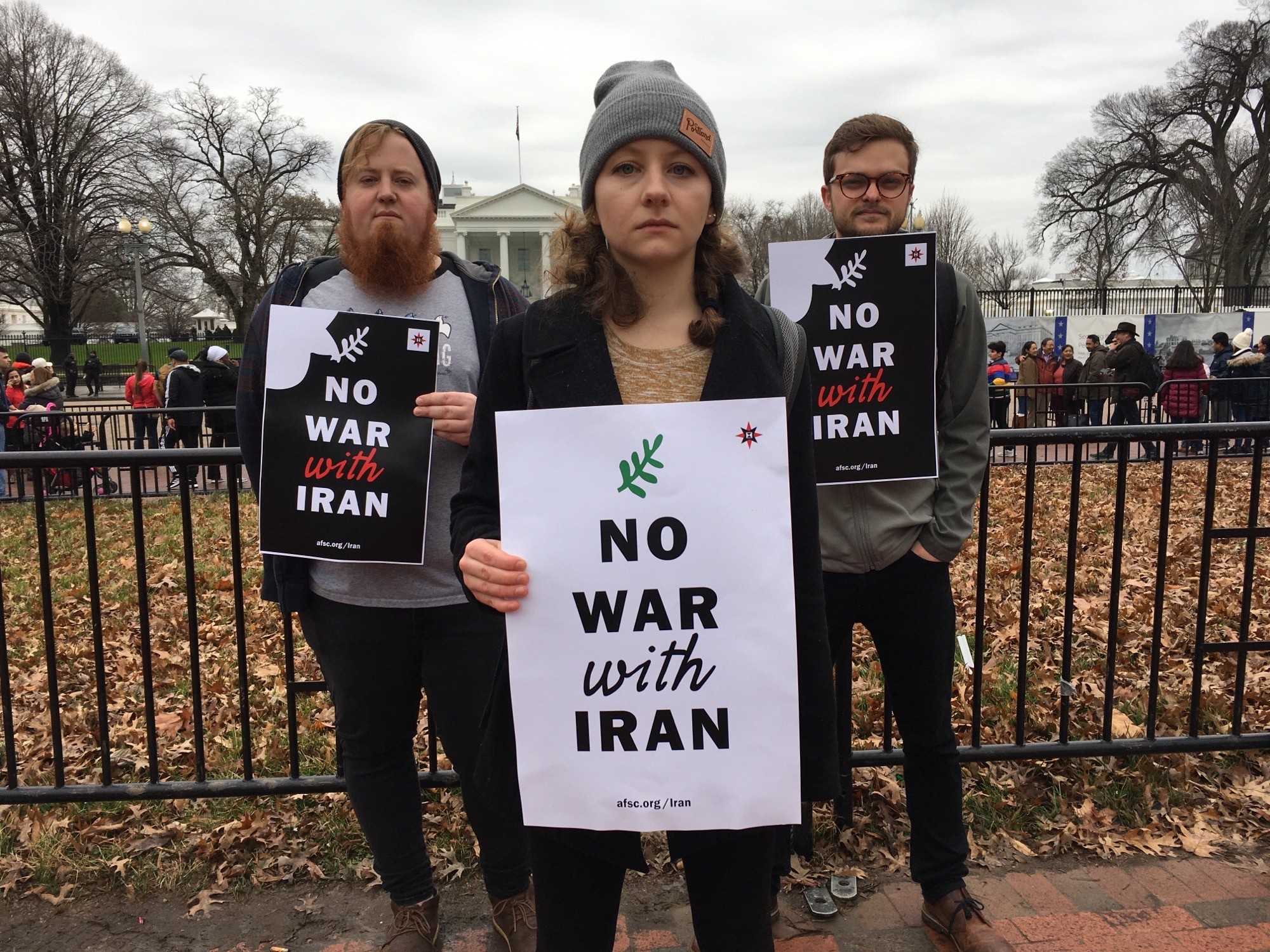
No War with Iran rally in Washington, D.C. on Jan. 4. Carl Roose / AFSC
It seems unfathomable that the U.S. would seek to provoke further wars in the Middle East, but right now the Trump administration is rapidly escalating tensions with Iran.
Take action today: Tell Congress to stop war with Iran!
Here’s what you need to know and how you can call for lasting peace.
1. U.S. aggression toward Iran has brought us to the edge of war.
On Jan. 2, 2020, the United States claimed responsibility for a drone strike that killed General Qassem Soleimani, head of Iran’s Quds Force, at the Baghdad International Airport.
This action was an extraordinary provocation, and will likely lead to more death, destruction, and instability in the region. Shortly after the strike, the administration deployed additional troops to the region, and Iran attacked two U.S. bases in Iraq as retaliation for the death of Soleimani.
If there is one thing we learned from U.S. military intervention in Iraq, it's that war does not make anyone safer—it only further entrenches and expands conflicts.
2. These recent developments are just the latest in a long line of provocations between Iran and the U.S.
What’s happening now follows a series of provocations, which include:
In 2019:
- The U.S. accused Iran of being behind drone and cruise missile attacks on Saudi Arabian oil facilities, even though the Houthi militia in Yemen claimed responsibility.
- The U.S. attempted to bribe the captain of an Iranian ship in order to seize the tanker and the 2.1 million barrels of oil it carried.
- Iran shot down an unmanned U.S. surveillance drone it says crossed into Iranian airspace. Trump ordered retaliatory strikes, only calling them off at the last minute.
- The U.S. accused Iran of using naval mines to attack two tankers near the Strait of Hormuz.
In 2018: The U.S. withdrew from the Iran nuclear deal, prompting a long list of announcements from Iran that it had breached limits on enriched uranium production and nuclear research that had been imposed by the deal.
In 2017: Iranians were incorporated into the Trump administration’s Muslim ban, and economic sanctions were imposed by each nation on the other.
Prior to these recent developments, tensions between the U.S. have spanned decades, reaching back to the CIA’s involvement in the 1953 coup that deposed Iran’s democratically elected leader to establish a dictatorship friendlier to U.S. and U.K. oil interests, and including numerous high-profile standoffs over the intervening decades.
3. Congress has the power to say “NO” to war with Iran but has so far refused to do so.
Just last month, Congress passed a defense bill that had been stripped of an amendment that would have required congressional authorization for a war with Iran. In another bill, they removed a provision that would have placed an expiration date on the 2001 Authorization for Use of Military Force (AUMF), which is likely to be used as justification for military action against Iran.
Instead of putting a check on the president’s ability to declare war, Congress has abdicated its responsibility and allowed for unrestricted aggression toward Iran from the Trump administration.
4. The calls for war with Iran echo the misguided calls for war with Iraq.
From the framing of tensions as attacks on the world's oil supply, to accusations of guilt for attacks based on the intelligence community's assessment of limited evidence, the calls for war with Iran are eerily similar to those that led us into war with Iraq.
In order to bolster its perceived economic and political interests in the region, the U.S is promoting war, despite the fact that Iran has not developed nuclear weapons, had signed the 2015 Iran nuclear deal, and has agreed to further international monitoring.
In addition, military action against Iran would likely be based on the 2001 AUMF, which in the aftermath of 9/11, vastly expanded the president’s ability to wage war—an authorization that has been since stretched far beyond its original intent.
5. War with Iran–or any country–is never the answer.
AFSC stands against any military action against Iran. We reject the idea that national security is a zero-sum game and seek a model of security that recognizes the interconnectedness of all people.
Some members of Congress have spoken out about the need to restrict the president's ability to wage war, and have introduced legislation taking steps in that direction. Visit our Iran resource page to learn more.
You can also download our "No war with Iran" posters for protests and actions calling for peace.